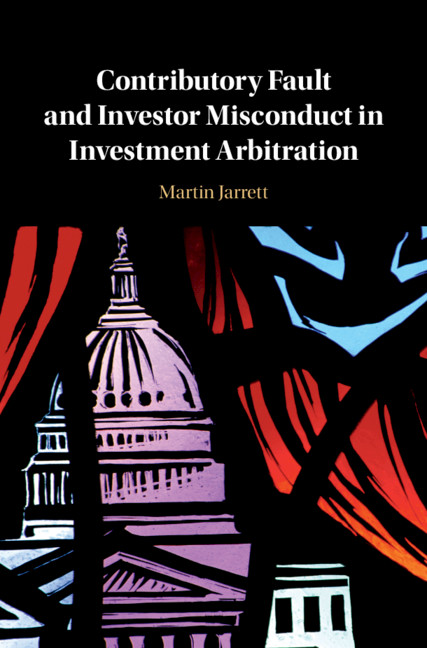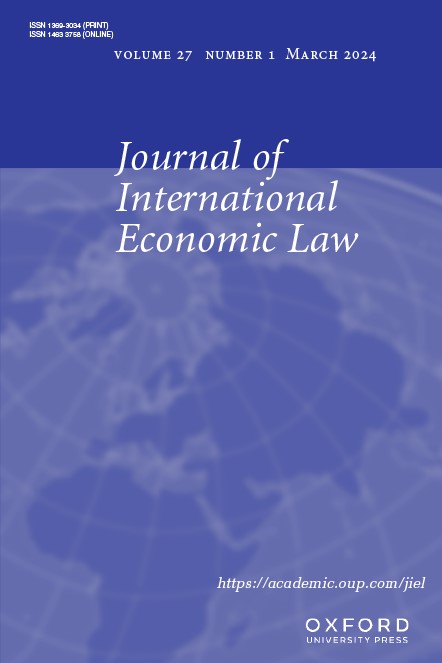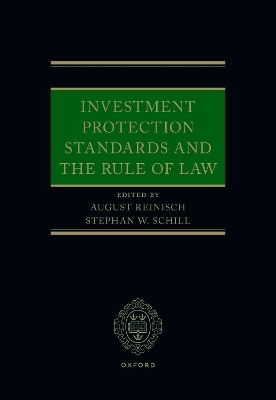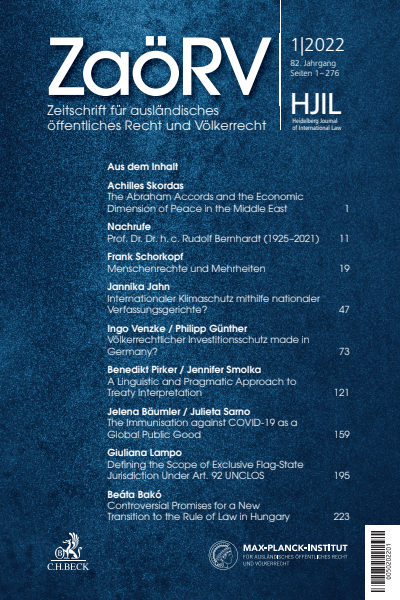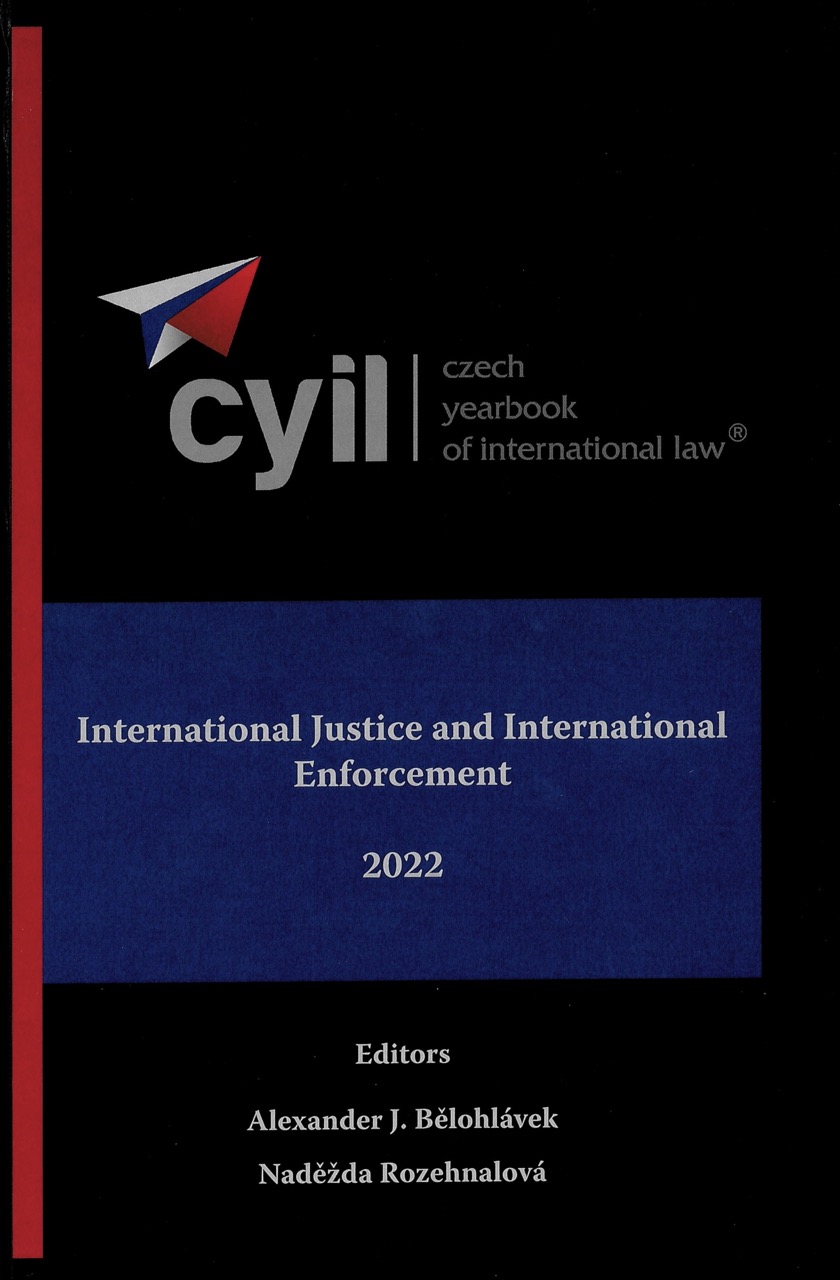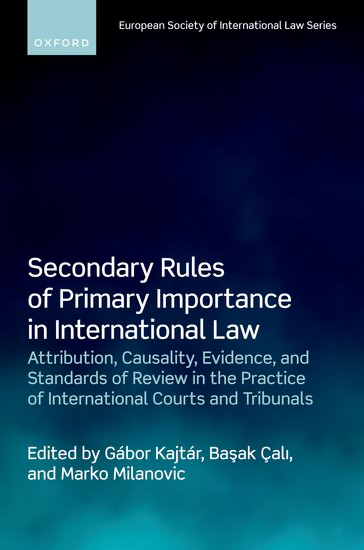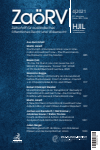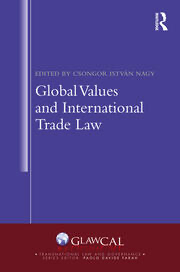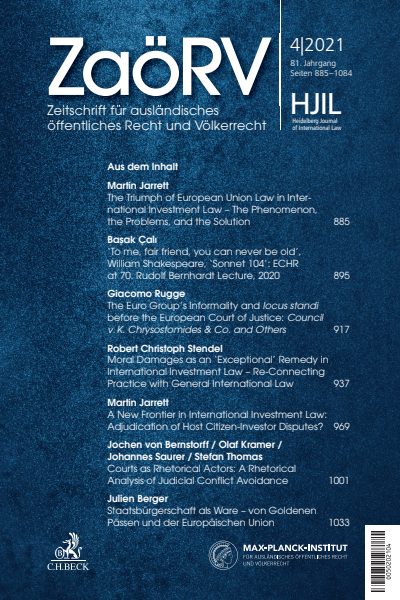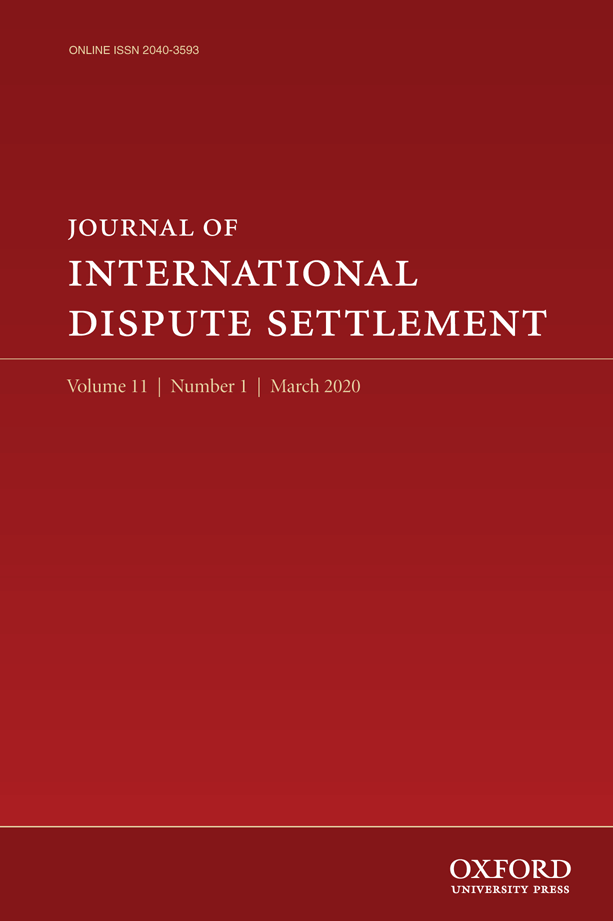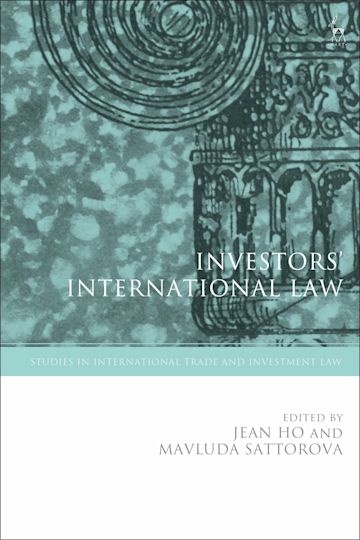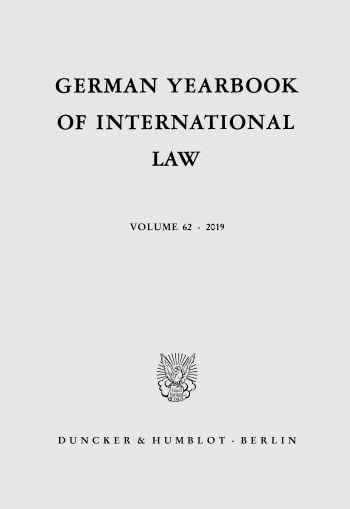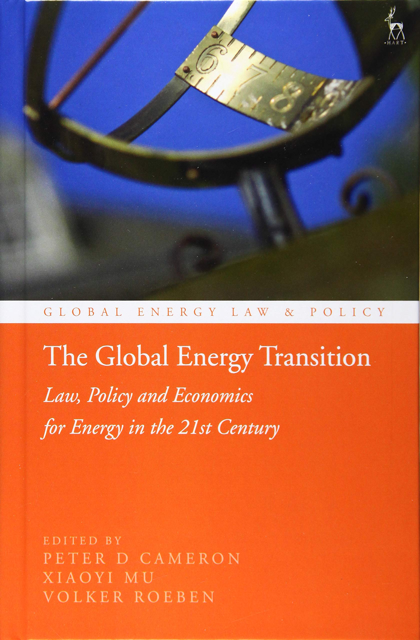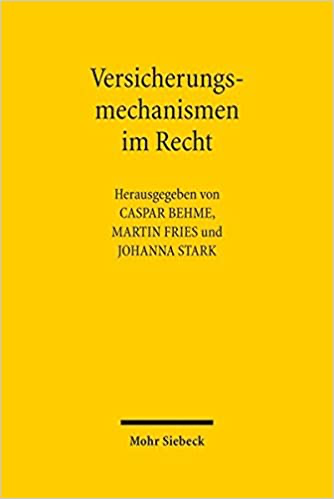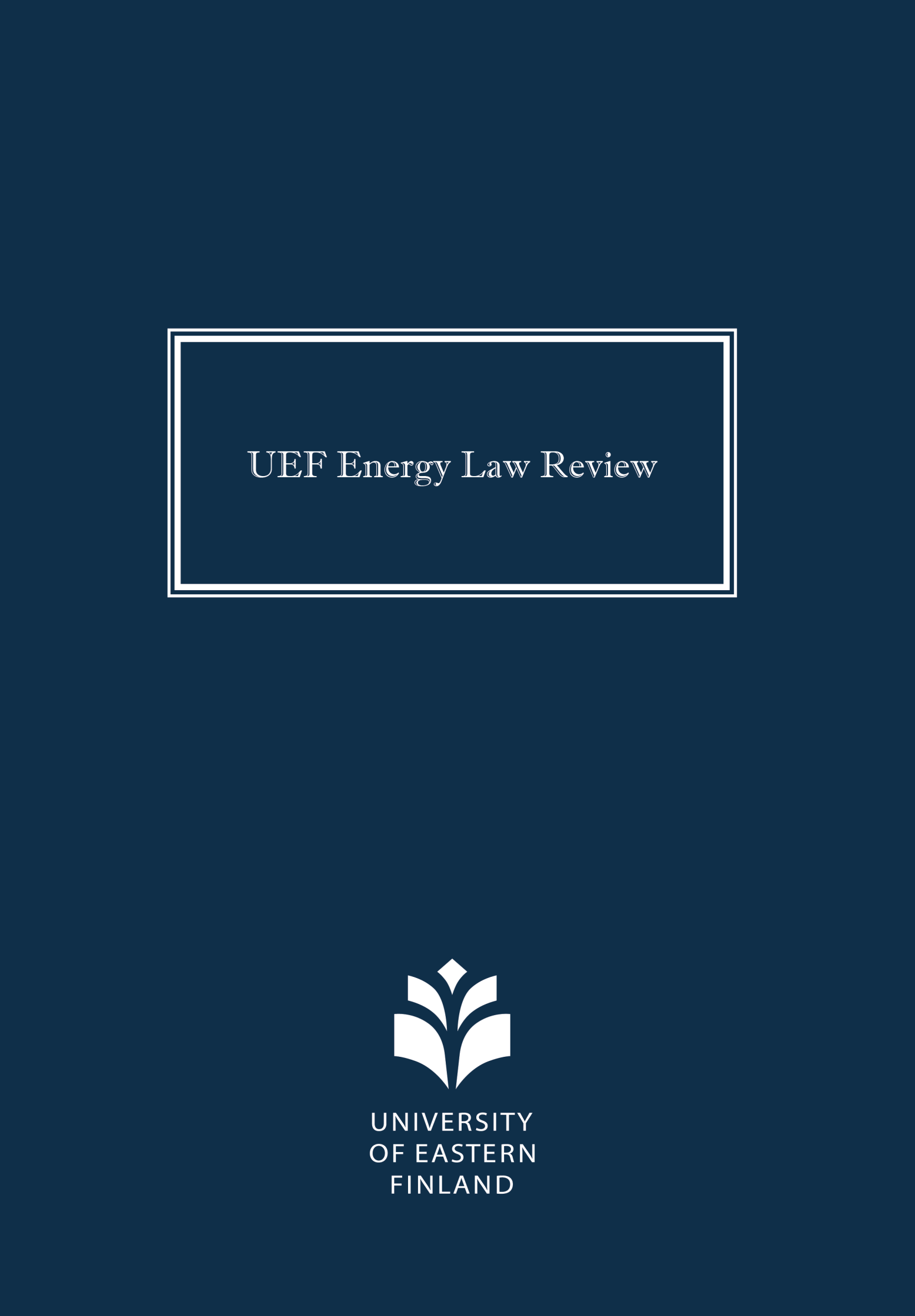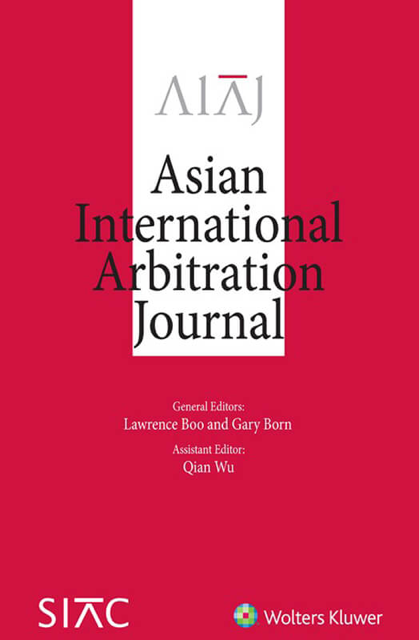Martin
Jarrett
Dr. iur., Referent
jarrett@mpil.de
Tel. +49 (6221) 482-633
Forschungsschwerpunkte:
Internationales Recht; Staatenverantwortlichkeit; und Internationales Investitionsrecht
Wissenschaftlicher Werdegang:
Akademische Positionen:
Apr. 2021 – Jul. 2022: Lehrbeauftragter, Ruprecht-Karls-Universität Heidelberg (link)
Seit Jan. 2020: Referent, MPIL
Jul. 2012 – Dez. 2019: wissenschaflicher Mitarbeiter, Universität Mannheim.
Akademische Qualifikationen:
- Dr. jur. (summa cum laude), Universität Mannheim (Doktorarbeit: Contributory Fault Defences in International Investment Law; Betreuer Prof. Dr. Oliver Brand, LL.M.)
- Graduate Diploma of Legal Practice, College of Law (Sydney)
- Bachelor of Laws (first class honours), University of Newcastle (Australia)
- Bachelor of Arts, University of Newcastle (Australia)
Forschungsaufenthalten:
Dez. – Mär. 2019: Gastforscher, University of Sydney
Aug. – Sep. 2018: Gastforscher, University of Helsinki
Jul. – Aug. 2018: Gastforscher, George Washington University
Jul. – Aug. 2017: Gastforscher, University of Sydney
berufliche Qualifikation:
Solicitor and Barrister (New South Wales, Australien) (nicht activ)
Aktuelle Publikationen
-
The Rise of Domestic Courts in International Investment Law.
Oxford University Press, Oxford, 2026, 400 S., im Erscheinen.
(Hrsg. mit
Chester Brown,
Stephan Schill).
-
Contributory Fault and Investor Misconduct in Investment Arbitration.
Cambridge University Press,
Cambridge, 2019, 182 S.
Link to Book
-
Trusteeships Over Russian-Owned Investments in Germany. In: Economic Sanctions in International Economic Law: Exploring the Normative Shifts in Response to the Russian-Ukrainian Conflict, Marcin Menkes. Brill, Leiden 2024,
x-x, im Erscheinen.
-
The Investment-Protection Status of Fossil Fuel–Related Investments in International Investment Law. In: Global Energy Transition and Investment Disputes,
Rahmi Kopar,
Volker Roeben (Hrsg.). Hart Publishing, Oxford 2024,
x-x, im Erscheinen.
-
Rebalancing Asymmetries between Host States and Investors in Asian ISDS: An Exception for Systemic Corruption. In: Corruption and Illegality in Asian Investment Arbitration,
Bruno Jetin,
Luke Nottage,
Nobu Teramura (Hrsg.). Springer, Singapore 2024,
185-208.
Link
-
ISDS 2.0: Time for a Doctrine of Precedent?
In: Journal of International Economic Law 27, 41-53 (2024). doi: https://doi.org/10.1093/jiel/jgad033.
Link to Text (Open Access)
-
The International Validity of Domestic Law in Investment-Treaty Arbitration.
In: Arbitration International 39, 1-18 (2023). doi: https://doi.org/10.1093/arbint/aiad001.
Link to Text (Open Access)
-
Legality Requirements: Managing the Tension between the Domestic and the International Rule of Law. In: Investment Protection Standards and the Rule of Law,
August Reinisch,
Stephan Schill (Hrsg.). Oxford University Press, Oxford 2023,
215-232.
Link to Text
-
Buchbesprechung:
Van Harten, Gus:
The Trouble with Foreign Investor Protection, Oxford, 2020.
In: Zeitschrift für ausländisches öffentliches Recht und Völkerrecht, 82(1), 269-278, 2022.
Link to Text (Open Access)
-
Implicit Legality Requirements in Investment-Treaty Arbitration: A Doctrinal Critique of Current Jurisprudence.
In: Czech Yearbook of International Law 13, 3-22 (2022).
Link to Text (Open Access)
-
Extracting Legal Causation from International Investment Law. In: Secondary Rules of Primary Importance: Attribution, Causality, Standard of Review and Evidentiary Rules in International Law,
Başak Çali,
Marko Milanovic,
Gabor Kajtar (Hrsg.). Oxford University Press, Oxford 2022,
x-x.
Link to Book
-
The Triumph of European Union Law in International Investment Law – The Phenomenon, the Problems, and the Solution.
In: Zeitschrift für ausländisches öffentliches Recht und Völkerrecht 81(4), 885-895 (2021). doi: https://doi.org/10.17104/0044-2348-2021-4-885.
Link to Text (Open Access)
-
Extricating the Illegality Element from Judicial Expropriation. In: Global Values and International Trade Law,
Csongor István Nagy (Hrsg.). Routledge Publishing, New York 2022,
163-185.
Link to Text (Open Access)
-
A New Frontier in International Investment Law: Adjudication of Host Citizen-Investor Disputes?
In: Zeitschrift für ausländisches öffentliches Recht und Völkerrecht 81(4), 969-1001 (2021). doi: https://doi.org/10.17104/0044-2348-2021-4-969.
Link to Text (Open Access)
-
Investor Accountability: Indirect Actions, Direct Actions by States, and Direct Actions by Individuals.
In: Journal of International Dispute Settlement 13(2), 259-280 (2022). doi: https://doi.org/10.1093/jnlids/idab035 (zusammen mit
Sergio Puig,
Steven Ratner).
Link to Text (Open Access)
-
Responding to Investor Misconduct: The Line between Lawful and Unlawful Responses and Apportionment in Cases of Unlawful Responses. In: Investors' International Law,
Jean Ho,
Mavluda Sattorova (Hrsg.). Hart Publishing, Oxford 2021,
169-191.
Link to Text (Open Access)
-
Contributory Fault and Investor Misconduct in Investment Arbitration.
In: German Yearbook of International Law 62 (2019), 629-633 (2021).
Link
-
A New Energy Charter Treaty for the Clean Energy Future. In: The Global Energy Transition: Law, Policy and Economics for Energy in the 21st Century,
Peter Cameron,
Xiaoyi Mu,
Volker Roeben (Hrsg.). Hart Publishing, Oxford 2021,
217-240.
Link
-
Contributory Fault in Foreign Investment Law. In: Versicherungsmechanismen im Recht,
Caspar Behme,
Martin Fries,
Johanna Stark (Hrsg.). Mohr Siebeck, Tübingen 2016,
45-70.
Link
-
Legally Protecting Upstream Investments.
In: University of Eastern Finland Energy Law Review 1, 50-79 (2016).
-
Optional Dispute Resolution Clauses and Conditional Arbitration Agreements.
In: Asian Journal of International Arbitration 9, 39-53 (2013).
Link
Blogposts
-
Aligning Legal Responsibility with Wrongfulness in the Calculation of Compensation in Investment-Treaty Disputes. Kluwer Arbitration Blog, 17 November 2023.
Link
-
Germany’s Trusteeship over Gazprom Germania: A Brewing Expropriation Claim?. EJIL:Talk!, 06. Juni 2022.
Link
-
New Options for Investor Accountability in ISDS. EJIL:Talk!, 22. Dezember 2022 (zusammen mit
Sergio Puig,
Steven Ratner).
Link
-
Causation in International Investment Law. Jus Mundi - Wiki Notes, 2020.
Link
-
The Only Thing We Have to Fear About Judicial Expropriation is the Fear of It. OpinioJuris, 20. Mai 2020.
Link
-
Standing Up to Investor Misconduct. Fifteeneightyfour, 25. Juni 2019.
Link
Working Papers
-
Extricating the Illegality Requirement from Judicial Expropriation. MPIL Research Paper Series, 2020.
Link
-
Extracting Legal Causation from International Investment Law. MPIL Research Paper Series, 2020.
Link
In Medien
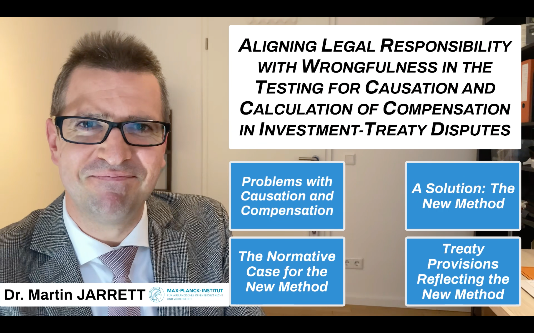
Here is a puzzle: arbitral tribunals insist that states have regulatory space under the rule on fair and equitable treatment, yet, when they test for causation and calculate compensation, they forget about this.
They test whether the state’s conduct was causal, not whether the unfair and inequitable aspect of the state’s conduct was causal.
If there is causality, they award compensation that covers all of the investor’s losses, as opposed to limiting compensation to the losses caused by the unfair and inequitable aspect of the state’s conduct.
In this video, I put forward a theory on how to solve this puzzle.
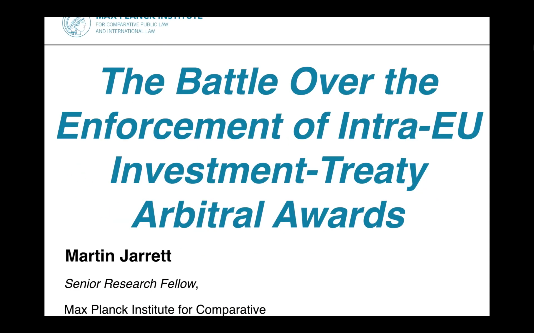
Seventeen-minute video analysing decisions from an English court and a Luxembourgish court on the enforcement of ICSID arbitral awards from intra-European Union investment-treaty arbitrations.
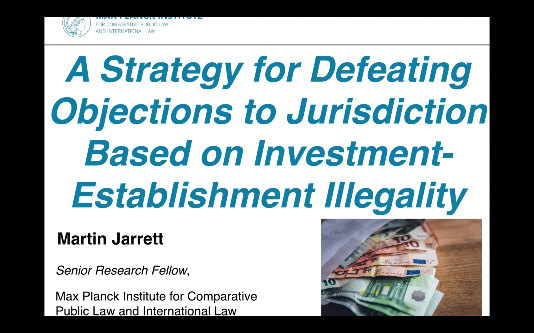
You are the legal counsel for the investor an investment-treaty arbitration. The investor looks like it has a good claim. It also looks like the arbitral tribunal has jurisdiction to hear this claim, but your opposition surprises you: the investor has participated in corruption in the process of making its investment. The evidence is overwhelming. The case looks lost. Is there anything that you can do?
In this video,I introduce a new strategy for defeating such jurisdictional objections, specifically using the doctrine of duress.
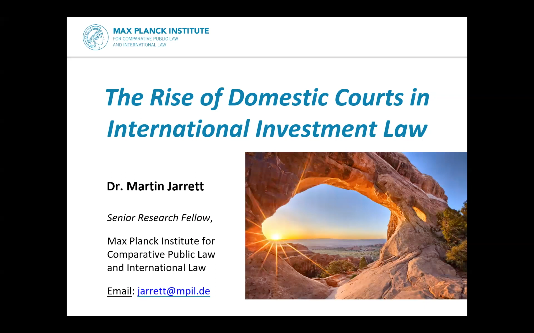
This video introduces a new research project: ‘The Rise of Domestic Courts in International Investment Law’.
For more details on this research project, please use the following link: https://martin-jarrett.com/research-project-the-rise-of-domestic-courts-in-international-investment-law
After detailing the background behind this research project, the main research question is introduced, which is: on account of the increasing involvement of domestic courts in investment-treaty disputes, how are they changing international investment law? This question is being tackled from multiple angles in the project.
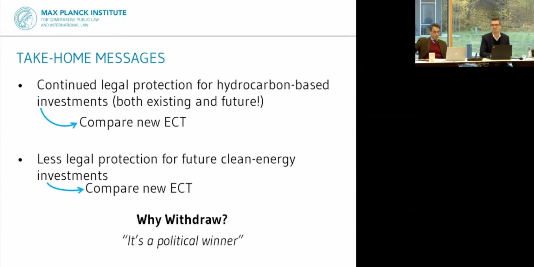
Over the past few months, a great drama has been played out in respect of the Energy Charter Treaty.
After the long process of the modernisation of this treaty was brought to an end with the conclusion of a final draft in June 2022, various European states signaled their intention to withdraw: first Poland, then the Netherlands, Spain, France, and Germany.
Now the European Union, Slovenia, and Austria are now mulling the possibility of withdrawing.
Despite the conclusion of the modernisation process, why are these states withdrawing?
Put simply, they do not believe that the Energy Charter Treaty is compatible with the implementation of the policies that we will be needed to achieve the energy transition.
Interestingly, however, withdrawing from the Energy Charter Treaty does not mean that the treaty no longer binds a withdrawing state.
Rather, its provisions can still continue to apply to it.
What this means is that by withdrawing from the treaty, contracting states are effectively trying to kill the Energy Charter Treaty, but even after this ‘death’, the Energy Charter Treaty continues to survive, hence ’the Zombification of the Energy Charter Treaty’.
In this video, I investigate whether, in its ‘zombified state’, the Energy Charter Treaty still inhibits the energy transition, with particular reference to how things would have been if the withdrawing states had signed the modernised Energy Charter Treaty.
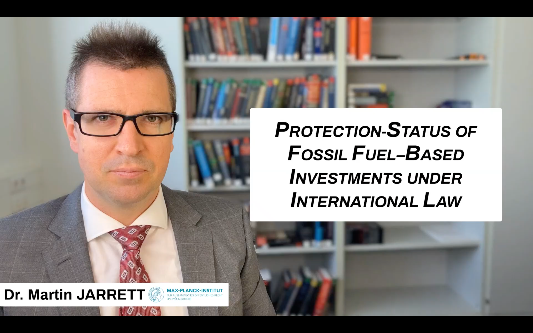
In late June 2022, important news broke on the international legal regime applicable to states’ treatment of energy-focused investments: the contracting states to the Energy Charter Treaty had reached an in-principle agreement to amend it.
In diplomatic speak, this amendment sought to ‘modernise’ the Energy Charter Treaty, particularly in light of the challenge posed by climate change.
One of the pivotal changes in this new modernised Energy Charter Treaty is the change to the definition of ‘investment’.
The importance of this definition cannot be overstated.
It defines exactly what investments receive protection-status under the Energy Charter Treaty.
Accordingly, if fossil fuel–based investments are excluded from its scope, it means that they do not have protection-status under the Energy Charter Treaty, with the result that investors with such investments cannot sue states under this treaty.
The European Union pushed for such an exclusion, but there was pushback from other contracting states.
What emerged was a kind of compromise: states could opt out of protection for fossil fuel–based investments.
Does this political solution stand up legally, however?
This video investigates this question.
It identifies a number of issues that the drafters will have to address as they go about drafting up this compromise.
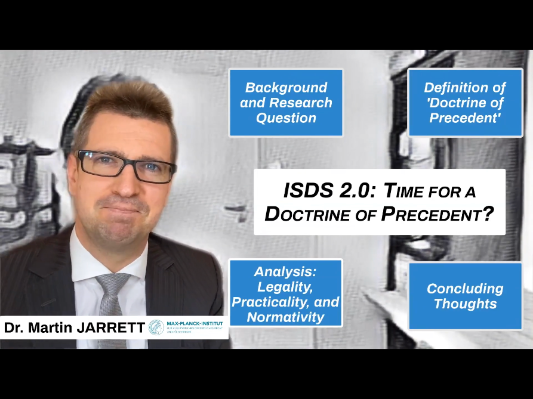
The reform process for ISDS at UNCITRAL is reaching its climax.
Within the next few years, a treaty for ISDS 2.0 should emerge from this process.
It is expected that one feature of ISDS 2.0 will be an appellate mechanism.
It would hopefully address one of the main issues that has plagued ISDS 1.0, specifically the disunity of adjudicator-made jurisprudence in international investment law.
Given this role for the appellate mechanism, a question that has frequently arisen during the negotiations at UNCITRAL has been: should a doctrine of precedent be adopted into ISDS 2.0?
In this video, I offer my preliminary thoughts on this question.
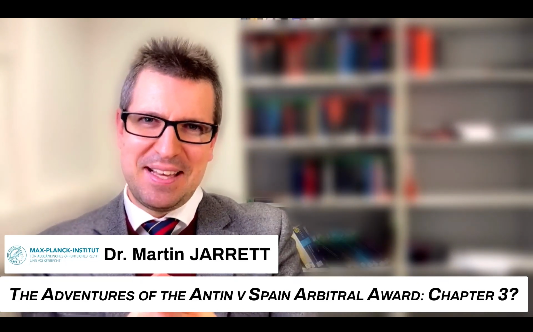
In this video, I recount the adventures of the Antin v Spain arbitral award.
And ‘adventures’ is the right word. While most arbitral awards are performed after their issuance, the arbitral award from Antin v Spain has been on a roller-coaster ride.
The first section of that ride was the jurisprudence of the European Court of Justice that culminated in the decision of Moldova v Komstroy.
In that case, the European Court of Justice effectively ruled that the investment-treaty arbitration that was Antin v Spain was illegal under European law.
Enforcement of the arbitral award in the European Union is now impossible.
Where could the arbitral award be enforced?
One potential jurisdiction was Australia.
And, indeed, Australian courts have enforced the arbitral award.
But that action has provoked a response from the European Commission, which is now investigating whether payments to Antin under the Australian judgment would constitute (unlawful) European state aid.
In a world where the European Commission does order Spain to retake the amount that it pays to Antin pursuant to the Australian judgment, does that amount to a good faith breach by Spain of the ICSID Convention?
This is the question of the third chapter of this story and it is one that this presentation casts a light on.
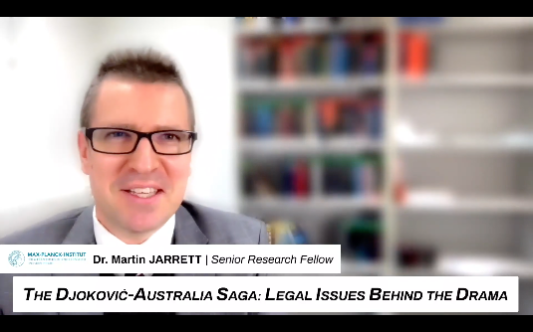
It has been the news story of the year so far: the Djoković-Australia saga.
There are many fascinating elements to this saga, from the vaccination issue to the sporting story, specifically whether Djoković could win his 21st grand slam at the Australian Open.
But this saga was fundamentally a legal story.
In this video I give a comprehensive account of the legal story.
It focuses specifically on the difficult legal issues that the Djoković-Australia saga raised.
After looking through the various legal proceedings, a provocative question is considered at the end: what does this saga show about the health of the rule of law in Australia?
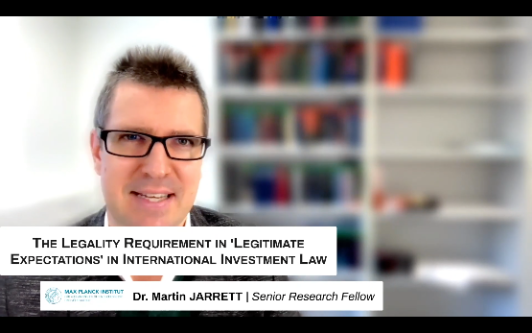
No other legal concept in international investment law provokes controversy like legitimate expectations.
When arbitral tribunals have to apply it, they have to engage in a delicate balancing act.
On the one side, there is investors’ interest in a stable regulatory regime for their investment activities, while, on the other side, there is states’ interest in changing that regime to better fit to the changing circumstances in the society over which they govern.
Because balancing these interests is such a difficult task, any new jurisprudence on legitimate expectations is always significant.
This video reports on such new jurisprudence: the legality requirement in legitimate expectations in International investment law.
In this video,I describe this new jurisprudence, doctrinally critiques it, and proposes alternative jurisprudence to take its place.
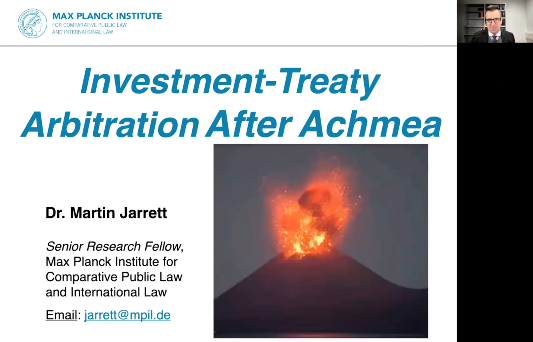
In March 2018, the European Court of Justice handed down its decision in Slovakia v Achmea. This decision let off a Krakatoa-like eruption in the world of international investment law. Effectively, the European Court of Justice sought to interdict investment-treaty arbitrations between European investors and EU Member States, noting that these disputes make up a large portion of all investment-treaty arbitrations. As the dust has now settled after the initial blast, it is time to take stock and ask: what impact has the Achmea Decision actually had? In this video, I give an overview of the legal issues that arose in international investment law post-Achmea and examines the responses to those issues.
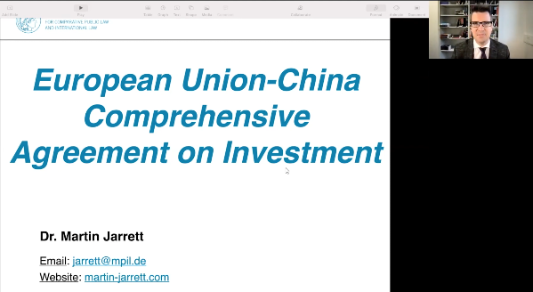
In December 2020, China and the European Union concluded the long-awaited China-EU Investment Agreement, officially known as EU-China Comprehensive Agreement on Investment. Its significance cannot be overstated – it will provide the legal framework for European investment into China and Chinese investment into Europe.
In this presentation I give an overview of the contents of the treaty and identify its positive and negative aspects.
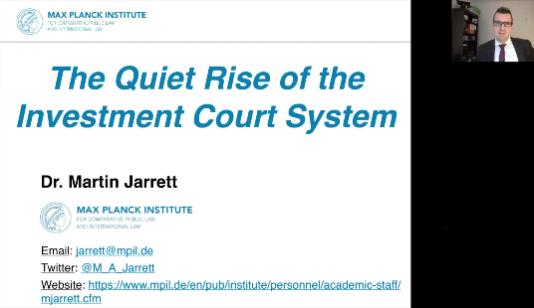
As part of its broader push to ‘Unionise’ international investment law, the European Union has proposed the Investment Court System (from which the Multilateral Investment Court derives) to replace traditional investor-state arbitration (ISDS). In this presentation I give an overview of the two distinctive features of the Investment Court System relative to traditional investor-state arbitration, namely the random appointment of arbitrators from a pool of state-chosen potential arbitrators and the appellate tier. These overviews highlight the legal problems that the introduction of these two innovations could give rise to. To conclude, some comments are offered on the future challenges that the European Union has to overcome in making the Investment Court System a reality.
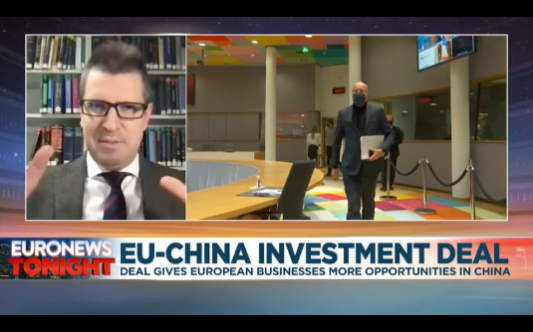
In this video, I am interviewed on ‘Euronews Tonight’ (30 December 2020) on the China-EU Investment Agreement.
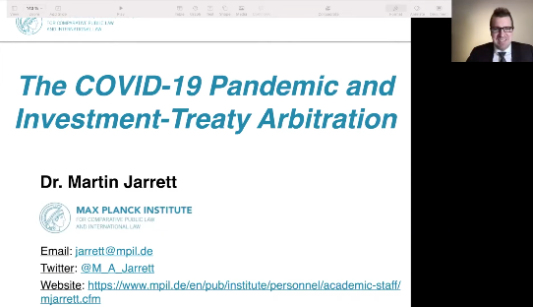
When governments began implementing tough Covid-related measures and the business world started hurting, law firms were quick to remind investors that they have possibilities to complain about these measures under investment treaties. Civil society groups saw the threat of a flood of investment-treaty claims. An offensive was started in the media to bring attention to this apparent problem. Further, a draft treaty was produced that would operate to stop the flood – 'Agreement for the coordinated suspension of investor-state dispute settlement with respect to COVID-19 related measures and disputes’. In this video, I analyse some of the legal technicalities of this proposed treaty. Three issues are in focus:
- Can investors’ access to arbitration be suspended without their consent?
- If a state exercised its discretion and elected to suspend investors’ access to arbitration, would that suspension affect jurisdiction, admissibility, or merits?
- Is this proposed treaty necessary considering the defences that are available to states to defend themselves against Covid-related claims?
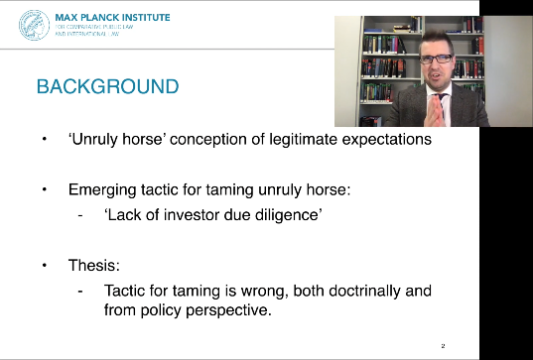
Legitimate expectations is the most controversial concept in the substantive law of international investment law. For many, it’s an unruly horse that investors ride to (undeserved) compensation. Working from this foundation, a doctrinal innovation has been developed to tame it: the idea that the investor cannot have legitimate expectations of certain performance by the state if it foresees that the state will probably not so perform.
In this video, I argue that this idea is doctrinally incorrect. But this doesn’t mean that the investor’s lack of due diligence is irrelevant to the state’s international responsibility. It is rather relevant via another concept, contributory fault. In the conclusion, he demonstrates how it assumes this relevance.

Could Indigenous Australians, who were not Australian citizens, be considered ‘aliens’ under the Australian Constitution? In a 4 – 3 decision, it decided that they could not. In this video, I review the reasoning of the majority judges and the minority judges.

The bad news: there is a phobia among arbitral tribunals for investor-state arbitrations – the ‘phobia of judicial expropriation’. Now, to the good news: there is a cure for this phobia. That cure involves a two-step treatment regime. The first step is dropping the requirement that any taking of an investment by a domestic court must also involve some kind of serious procedural illegality before it can be labelled expropriatory. The second step is fully appreciating the role of causation in making any determination of judicial expropriation. This video explains those steps. The payoff is the realisation that the only thing we have to fear about judicial expropriation is the fear of it.
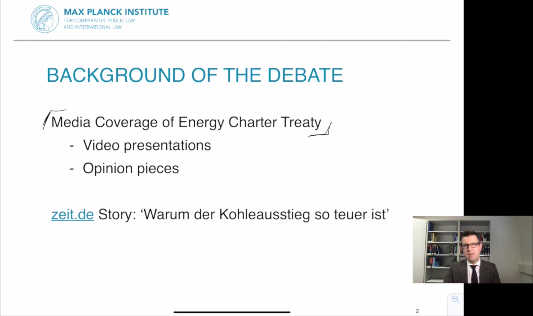
No other investment treaty compares to the Energy Charter Treaty (the ‘ECT’). It has 53 contracting parties, more than any other investment treaty. Further, it has given rise to more than 130 investor-state arbitrations, again, more than any other investment treaty. Accordingly, when the contracting parties announced in the Bucharest Declaration that the ECT had to be modernised in light of new realities, it was a significant moment in the history of international investment law. This presentation examines this modernisation process, specifically focusing on the legal questions that will come up in this process. It begins with the legal mechanics for amending the ECT. The focus then shifts to the 'EU Text Proposal for the Modernisation of the Energy Charter Treaty’ (the ‘Draft Proposal’). First, it looks at the legal validity of the European Commission's attempts to harden the obligations of the Paris Agreement. Second, it compares the concept of legitimate expectations, as outlined in the Draft Proposal, to the jurisprudence on legitimate expectations that has emerged from the many recent ECT investor-Spain arbitrations. Third, the idea that withdrawing a subsidy to an investor by order of a 'competent authority’ could be a defence to a breach of a state's obligations vis-a-vis the treatment of investments is critiqued. It is argued that this idea is incompatible with a basic principle from the law on international responsibility, namely that domestic law should have no legally determinative role in answering the question of a state's international responsibility.
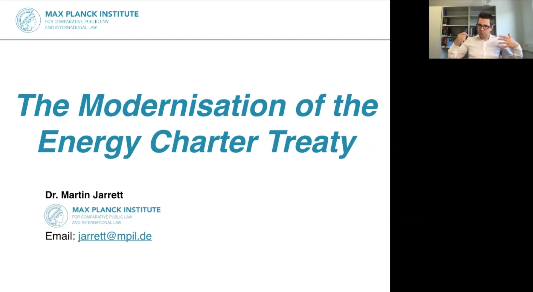
No other investment treaty compares to the Energy Charter Treaty (the ‘ECT’). It has 53 contracting parties, more than any other investment treaty. Further, it has given rise to more than 130 investor-state arbitrations, again, more than any other investment treaty. Accordingly, when the contracting parties announced in the Bucharest Declaration that the ECT had to be modernised in light of new realities, it was a significant moment in the history of international investment law. This presentation examines this modernisation process, specifically focusing on the legal questions that will come up in this process. It begins with the legal mechanics for amending the ECT. The focus then shifts to the 'EU Text Proposal for the Modernisation of the Energy Charter Treaty’ (the ‘Draft Proposal’). First, it looks at the legal validity of the European Commission's attempts to harden the obligations of the Paris Agreement. Second, it compares the concept of legitimate expectations, as outlined in the Draft Proposal, to the jurisprudence on legitimate expectations that has emerged from the many recent ECT investor-Spain arbitrations. Third, the idea that withdrawing a subsidy to an investor by order of a 'competent authority’ could be a defence to a breach of a state's obligations vis-a-vis the treatment of investments is critiqued. It is argued that this idea is incompatible with a basic principle from the law on international responsibility, namely that domestic law should have no legally determinative role in answering the question of a state's international responsibility.
Vorträge
30.11.2023
Aligning Legal Responsibility with Wrongfulness in Investment-Treaty Arbitrations
New York City Bar Association
Link to Video Recording
24.07.2023
The Battle over the Enforcement of Intra-EU Investment-Treaty Arbitral Awards
Monday Meeting
Max Planck Institute for Comparative Public Law and International Law
Link to Video Recording
07.07.2023
Public Policy–Based Challenges to Investment-Treaty Arbitral Awards
Workshop: The Rise of Domestic Courts in International Investment Law (Workshop 2)
Max-Planck-Institut für ausländisches öffentliches Recht und Völkerrecht
Programm
(1686.7 KB)
05.06.2023
Case Review of 'Thiab v Western Sydney University'
Montagsrunde
Max-Planck-Institut für ausländisches öffentliches Recht und Völkerrecht
29.03.2023
An Academic Perspective on a Potential Multilateral Investment Court
Establishment of a Multilateral Investment Court: Merits, Concerns & Future of ISDS
United Nations Headquarters
Programm
Slides
(4021.5 KB)
28.03.2023
Towards Greater Investor Accountability
Side Event to 45th Session of UNCITRAL Working Group III
United Nations Headquarters
Programm
24.11.2022
Testing Fault-Aspect Causality in the Multilateral Investment Court
Workshop: Making a Multilateral Investment Court Beneficial for Sub-Saharan Africa?
University of the Witwatersrand
Programm
(651.9 KB)
15.11.2022
The Rise of Domestic Courts in Investment-Treaty Arbitration
Lunch-Time Talk
Rechtswissenschaftliche Fakultät, Universität des Saarlandes
Flyer
(456.9 KB)
28.10.2022
Public Policy–Based Challenges to Investment-Treaty Arbitral Awards
Workshop: The Rise of Domestic Courts in International Investment Law
University of Sydney
Programm
(178.3 KB)
25.07.2022
Fynerdale Holdings BV v. Czechia: A Critical Expansion of the Investment-Legality Requirement in Investment-Treaty Arbitration
Referentenbesprechung
Max-Planck-Institut für ausländisches öffentliches Recht und Völkerrecht
15.07.2022
The Present and Future Protection-Status of Fossil Fuel–Related Investments under International Law
Conference: Global Energy Transition and Investment Disputes
University of Durham
Programm
14.07.2022
The International Lawfulness of Germany’s Trusteeship over Gazprom Germania
Conference: Russian Aggression on Ukraine from the International Economic Law Perspective
Warsaw School of Economics
Programm
(456.0 KB)
23.05.2022
The Legal Validity of Imposing Treaty Obligations on Individuals
Conference: The Concept of Obligation in International Law
University of Milano-Bicocca
Programm
(299.0 KB)
25.02.2022
Australian Enforcement of Eiser v Spain Arbitral Award: Responses from the European Commission
2022 Sydney Centre for International Law Year in Review Conference
University of Sydney
Video des Vortrags
Programm
(462.3 KB)
17.01.2022
The Djokovic-Australia Saga: Legal Issues Behind the Drama
Referentenbesprechung
Max-Planck-Institut für ausländisches öffentliches Recht und Völkerrecht, Heidelberg, Deutschland
Video des Vortrags
15.11.2021
Investment-Treaty Arbitration after Achmea
Referentenbesprechung
Max-Planck-Institut für ausländisches öffentliches Recht und Völkerrecht, Heidelberg, Deutschland
Video des Vortrags
29.10.2021
Competition Authorities and Foreign Investors: Managing the Litigation Risk under the AfCFTA Investment Protocol
Konferenz: 10th Annual Conference of the African Society of International Law: Africa and International Trade Law
African Union, Addis Ababa
Programm
(3185.6 KB)
08.09.2021
Overcoming the Assumption of Inevitable Bias of Judges on the Multilateral Investment Court: Time for a Doctrine of Precedent?
Tagung: 2021 ESIL International Economic Law Workshop
Universität Stockholm, Schweden
Programm
(190.5 KB)
12.07.2021
BayWa v Spain: A Jurisprudential Turn for the Worse
Referentenbesprechung
Max-Planck-Institut für ausländisches öffentliches Recht und Völkerrecht, Heidelberg, Deutschland
10.05.2021
European Union - China Comprehensive Agreement on Investment
Referentenbesprechung
Max-Planck-Institut für ausländisches öffentliches Recht und Völkerrecht, Heidelberg, Deutschland
Video des Vortrags
15.04.2021
A New Frontier in International Investment Law: Adjudication of Host Citizen-Investor Disputes?
Tagung: Workshop of the ESIL International Economic Law Interest Group at the 2021 ESIL Catania Research Forum
University of Catania (online event)
Programm
08.02.2021
The Quiet Rise of the Investment Court System
Referentenbesprechung
Max-Planck-Institut für ausländisches öffentliches Recht und Völkerrecht, Heidelberg, Deutschland
Video des Vortrags
30.11.2020
The Covid-19 Pandemic and Investment-Treaty Arbitration
Referentenbesprechung
Max-Planck-Institut für ausländisches öffentliches Recht und Völkerrecht, Heidelberg, Deutschland
Video des Vortrags
02.11.2020
The Status of Non-Citizen Indigenous Australians under The Australian Constitution
Referentenbesprechung
Max-Planck-Institut für ausländisches öffentliches Recht und Völkerrecht, Heidelberg, Deutschland
Video des Vortrags
22.06.2020
The Modernisation of the Energy Charter Treaty
Referentenbesprechung
Max-Planck-Institut für ausländisches öffentliches Recht und Völkerrecht, Heidelberg, Deutschland
Video des Vortrags
29.02.2020
The Challenges of Creating a Doctrine of Precedent for International Investment Law
Tagung: South Asia in the Era of International Courts and Tribunals
South Asian Universität, Neu Delhi, Indien
Programm
29.01.2020
Overcoming the Challenges of Embedding Counterclaims into the Framework of International Investment Law
Tagung: Trade and Investment Law Timeout Session
Department of Foreign Affairs and Trade, Canberra, Australien
24.10.2019
Imposing Directive-Based Human Rights Obligations on Investors in International Investment Law
Tagung: Socially Responsible Foreign Investment under International Law
Katholisches Universität Portugal, Lissabon, Portugal
Programm
19.09.2019
The Potential for Creating Consistent Investment Treaty Case Law via the Investment Tribunal System
Tagung: ILA 2019 Regional Conference
Universität Minho, Braga, Portugal
Programm
15.09.2019
Shaping the Multilateral Investment Court System into the Chinese Mould
Tagung: Multilateral Reform of Investor-State Dispute Resolution: A Dialogue among Different Approaches
The Silk Road Institute for International and Comparative Law, Xi'an Jiaotong Universität, China
Programm
04.09.2019
Granting Standing to Natural Persons and Local Communities for Human Rights-Based Claims in Investment Arbitration
Tagung: The Legitimacy of International Investment Law and Arbitration in Protecting Human Rights
PluriCourts, Oslo, Norwegen
Programm
19.07.2019
The Validity of Investor Obligations in Investment Treaties
Tagung: Fourth African International Economic Law Network Biennial Conference
Strathmore Universität, Nairobi, Kenia
Programm
20.06.2019
Fighting Corruption via Effective Transparency Obligations and Civil Participation in Investment Treaties
Tagung: Corruption Democracy and Human Rights: Exploring New Avenues in the Fight Against Corruption
European University Institute, Florenz, Italien
16.05.2019
A Theory of Causation for International Investment Law
Tagung: ESIL-ELTE Law School Joint Workshop on 'Attribution, causality and evidentiary rules: Mere technicalities or the heart of the matter? Secondary rules of primary importance'
Eötvös Loránd Universität, Budapest, Ungarn
Programm
07.05.2019
The Reactionary Police Powers Defence
Tagung: 12th Annual McGill Graduate Law Conference
McGill Universität, Montreal, Kanada
02.05.2019
The Eastern Shift in International Investment Law
Tagung: 2019 CIBEL Global Network Young Scholars Workshop
Universität New South Wales, Sydney, Australien
Programm
22.02.2019
State Responsibility for the MH17 Incident
Tagung: 2019 Sydney Centre for International Law ‘Year in Review’
Universität Sydney, Sydney, Australien
Programm
15.02.2019
Reimaging Expropriation in International Investment Law
Tagung: ANZSIL International Economic Law Interest Group 2019 Workshop
Universität Canterbury, Christchurch, Neuseeland
13.12.2018
The Defence of Mismanagement in International Investment Law
Vortrag für mönatiche Treffen des Centre for Energy, Petroleum and Mineral Law and Policy
Universität Dundee, Dundee, Vereinigtes Königreich
03.12.2018
“In Accordance with Host State Law”-Clauses, Inherent Legality, and Good Faith Requirements
Tagung: ‘Investment Protection Standards and the Rule of Law’
Universität Wien, Wien, Österreich
04.05.2018
Rethinking Expropriation of Intellectual Property Investments
Tagung: Free Trade, Public Interest and Reality: New Generation Free Trade Agreements and National Regulatory Sovereignty
Ungarische Akademie der Wissenschaften, Szeged, Ungarn
Programm
20.04.2018
Environmental Warning Labels: the Perspective from International Investment Law
Tagung: Contemporary Challenges to International Law and Policy on Sustainable Development, Energy, Climate Change, Environmental Protection, Intellectual Property and Technology Transfer
Masaryk University, Brno, Tschechien
Programm
08.08.2017
An Overview of Contributory Fault Defences in International Investment Law
University of Sydney, Sydney, Australien
Programm
29.01.2016
Intellectual Property Investments and the Locality Condition for Jurisdiction
Tagung: 2nd Kobe Seminar on International Investment Law 2016
Kobe University, Kobe, Japan
Programm
13.11.2015
Causation, Expropriation, and Taxation
Tagung: ‘Settlement of Tax Disputes Under International Law’
Universität Luxemburg, Stadt Luxemburg, Luxemburg
08.05.2015
Contributory Fault in Foreign Investment Law
Tagung: Versicherungsmechanismen im Recht
Ludwig-Maximilians-Universität München, München, Deutschland
26.02.2015
Expropriation of Upstream Assets
Tagung: Energy Transitions
University of Eastern Finland, Joensuu, Finnland
Lehre
April – Juli 2022
Juristische Fakultät
Universität Heidelberg
Apr. – Juli 2021
Juristische Fakultät
Universität Heidelberg
Sep. 2019 - Dez. 2019
Fakultät für Rechtswissenschaft und Volkswirtschaftslehre,
Universität Mannheim, Deutschland
Sep. - Dez. 2019
Fakultät für Rechtswissenschaft und Volkswirtschaftslehre,
Universität Mannheim, Deutschland
Feb. 2019
Faculty of Law,
Universität Sydney, Australien
Sep. - Dez. 2018
Fakultät für Rechtswissenschaft und Volkswirtschaftslehre,
Universität Mannheim
Sep. - Dez. 2018
Fakultät für Rechtswissenschaft und Volkswirtschaftslehre,
Universität Mannheim, Deutschland
Sep. - Dez. 2018
Fakultät für Rechtswissenschaft und Volkswirtschaftslehre,
Universität Mannheim, Deutschland
Feb. - Jun. 2018
Fakultät für Rechtswissenschaft und Volkswirtschaftslehre,
Universität Mannheim, Deutschland
Apr. 2018
Department of Law,
Universität Umeå, Schweden
Sep. - Dez. 2017
Fakultät für Rechtswissenschaft und Volkswirtschaftslehre,
Universität Mannheim, Deutschland
Sep. - Dez. 2017
Fakultät für Rechtswissenschaft und Volkswirtschaftslehre,
Universität Mannheim, Deutschland
Apr. 2017
Department of Law,
Universität Umeå, Schweden
Feb. - Jun. 2017
Fakultät für Rechtswissenschaft und Volkswirtschaftslehre,
Universität Mannheim, Deutschland
Sep. - Dez. 2016
Fakultät für Rechtswissenschaft und Volkswirtschaftslehre,
Universität Mannheim, Deutschland
Apr. 2016
Department of Law,
Universität Umeå, Schweden
Feb. - Jun. 2016
Fakultät für Rechtswissenschaft und Volkswirtschaftslehre,
Universität Mannheim, Deutschland
Sep. - Dez. 2015
Fakultät für Rechtswissenschaft und Volkswirtschaftslehre,
Universität Mannheim, Deutschland, 18
Apr. 2015
Department of Law,
Univesität Umeå, Schweden
Feb. - Jun. 2015
Fakultät für Rechtswissenschaft und Volkswirtschaftslehre,
Universität Mannheim, Deutschland
Sep. - Dez- 2014
Fakultät für Rechtswissenschaft und Volkswirtschaftslehre,
Universität Mannheim, Deutschland
Feb. - Jun. 2014
Fakultät für Rechtswissenschaft und Volkswirtschaftslehre,
Universität Mannheim, Germany
Feb. - Jun. 2014
Fakultät für Rechtswissenschaft und Volkswirtschaftslehre,
Universität Mannheim, Deutschland
Nov. 2013
The School of the Humanities, Social Sciences and Economics
International Hellenic University, Griechenland
Teilnahme an Tagungen im In- und Ausland
46th Session, UNCITRAL Working Group III: Investor-State Dispute Settlement Reform Report of the Working Group, Vienna International Centre, 09.10.2023 - 13.10.2023
45th Session, UNCITRAL Working Group III: Investor-State Dispute Settlement Reform Report of the Working Group, United Nations Headquarters, 27.03.2023 - 31.03.2023
44th Session, UNCITRAL Working Group III: Investor-State Dispute Settlement Reform Report of the Working Group, Vienna International Centre, 23.01.2023 - 27.01.2023
Exploratory Workshop, Evidence-Based Policy Making Around the African Continental Free Trade Area: Bridging the Gap between Research and Practice (link), Deutsche Gesellschaft für Internationale Zusammenarbeit und Deutsches Institut für Entwicklungspolitik (online event), 29.03.2021 - 30.03.2021
40th Session, UNCITRAL Working Group III: Investor-State Dispute Settlement Reform
Report of Working Group, Vienna International Centre (online event), 08.02.2021 - 12.02.2021
39th Session, UNCITRAL Working Group III: Investor-State Dispute Settlement Reform
Report of Working Group, Vienna International Centre (online event), 05.10.2020 - 09.10.2020
Resumed 38th Session, UNCITRAL Working Group III: Investor-State Dispute Settlement Reform, Vienna International Centre, 20.01.2020 - 24.01.2020
Wissenschaftliche Auszeichnungen
Research Grant
- Summe: EUR 15,000
- Förderer: Fritz Thyssen Stiftung
- Programm: Tagungen
- Projekt: workshop 2 'The Rise of Domestic Courts in International Investment Law'
Research Grant
- Summe: EUR 20,000
- Förderer: Max Planck Society
- Programm: Kick-Off Workshop
- Zweck: workshop 1 'The Rise of Domestic Courts in International Investment Law'
Research Grant
- Summe: EUR 53,800
- Förderer: Volkswagen Stiftung
- Programm: Knowledge for Tomorrow
- Zweck: workshop 'Making a Multilateral Investment Court Beneficial for Sub-Saharan Africa?'
Research Grant
- Summe: EUR 250
- Förderer: European Society of International Law
- Programm: ESIL Travel Grants
- Zweck: Vortrag präsentieren (Athens)
Research Grant
- Summe: EUR 2,116
- Förderer: DAAD
- Programm: Kongressreiseprogramm
- Zweck: Vortrag präsentieren (Nairobi)
Research Grant
- Summe: EUR 200
- Förderer: European Society of International Law
- Programm: ESIL Travel Grants
- Zweck: Vortrag präsentieren (Budapest)
Research Grant
- Summe: EUR 3,897
- Förderer: DAAD
- Programm: IPID4all
- Zweck: Forschungsaufenhalt an der Universität Sydney
Mitgliedschaften
Sonstiges
Verwaltungsverpflictungen
Seit Juni 2021: gewählter Vertreter der Forschenden des Instituts auf Max-Planck-Gesellschaft Ebene
Peer-Review-Begutachtung
Gutachter für:
- Cambridge Law Journal
- Heidelberg Journal of International Law
- Journal of International Economic Law
- Journal of World Investment and Trade
- Yearbook of International Investment Law and Policy
Forschung in Massenmedien
New ECT Could Give Teeth to Paris Agreement, But Also Continue Fossil Fuel Protection (30 August 2022)
• Quelle: carboncopy
• Beschreibung: Beratung zu Journalist wegen neuen Energy Charter Treaty.
European Union–China Comprehensive Agreement on Investment (30 December 2020)
• Quelle: euronews (video)
• Beschreibung: TV Interview wegen EU-China CAI
Standing Up to Investor Misconduct (10 Oktober 2019)
• Quelle: Radio Regenbogen
• Beschreibung: radio interview für 'Campus-Report' (Radio Regenbogen) wegen Fehlverhalten der Investoren im internationales Recht und ein internationales Gericht für Investoren-Staaten Streitigkeiten.
'It was hard to look at their faces': MH17 victim's mother welcomes charges (20 Juni 2019).
• Quelle: Sydney Morning Herald
• Beschreibung: Beratung zu Journalist wegen die Verantwörtlichkeit unter internationales Recht für den MH17 Vorfall

